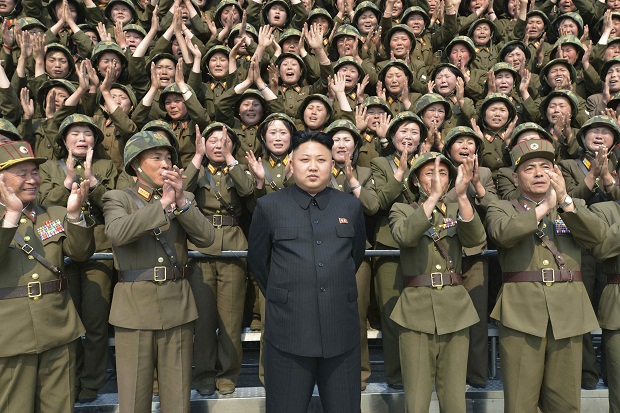- California Assembly OKs highest minimum wage in nation
- S. Korea unveils first graphic cigarette warnings
- US joins with South Korea, Japan in bid to deter North Korea
- LPGA golfer Chun In-gee finally back in action
- S. Korea won’t be top seed in final World Cup qualification round
- US men’s soccer misses 2nd straight Olympics
- US back on track in qualifying with 4-0 win over Guatemala
- High-intensity workout injuries spawn cottage industry
- CDC expands range of Zika mosquitoes into parts of Northeast
- Who knew? ‘The Walking Dead’ is helping families connect
N. Korea officially celebrates new time zone, ‘Pyongyang Time’
PYONGYANG, North Korea (AP) — North Korea now has its own time zone.
Bells were rung in Pyongyang and celebrations held at midnight as the nation’s clocks were set back 30 minutes to mark the Aug. 15, 1945 anniversary of the Korean Peninsula’s liberation from colonial rule at the end of World War II.
Previously, both Koreas and Japan shared the same time zone, nine hours ahead of GMT, which was established under Japan’s 1910-1945 colonial rule.
North Korea’s decision to change its time zone, announced last week, came as a surprise even to South Korea, whose president criticized Pyongyang for not coordinating the move with Seoul.
But the effort to erase the legacy of the colonial period resonates with many Koreans on both sides of the Demilitarized Zone who remember the harsh rule of the Japanese and continue to harbor deep resentment toward Tokyo.
“This is a great event in the history of the Korean nation, as it is of great significance in completely eradicating the leftovers of the Japanese imperialists in all fabrics of social life,” the North’s state-run Korean Central News Agency said in a commentary earlier this week.
The new time zone, which North Korea calls “Pyongyang Time,” was adopted by the then-unified Korea in 1908, but changed to the Japanese time zone on Jan. 1, 1912, two years after the peninsula was colonized. South Korea briefly revived the time old zone from 1954 to 1961, while North Korea stuck with the Japanese zone until now.
Pyongyang’s decision to create a 30-minute difference in time is unusual but not unprecedented. Countries such as India, Iran and Myanmar have half-hour differences from their neighbors. Nepal has a 45-minute lag.
Jong Sok, chief astronomer at the Pyongyang Observatory, said the change suits North Korea’s natural conditions.
“With the time standard that we have used up until now, the time when the sun is at its highest position is not correctly noon,” he told an AP television news crew in an interview. “I think it is the lawful right of a sovereign state that our republic, to mark the 70th anniversary of our liberation and the 70th anniversary of the defeat of Japanese imperialism, has announced our time as Pyongyang Time, the same as our ancestors used and which was robbed from us by the Japanese imperialists.”
Time zones were first proposed in the 19th century as global travel and communication became more important. They were standardized in the early 20th century around Greenwich Mean Time, named after the meridian which runs through an observatory in the London borough of Greenwich.
In using clocks to make a political statement, North Korea may be borrowing a page from the Chinese Communist Party playbook. China stretches 5,000 kilometers (3,100 miles) from east to west. But after taking power in 1949, the Communists put the whole country on Beijing Time as a means of emphasizing their control.
Though the time zone change may further isolate North Korea, which is already one of the most isolated places on earth, it gives the country something to rally around as it commemorates the defeat of the Japanese, which led to the establishment of the communist North and capitalist South.
The North has been quick to criticize South Korea for not similarly abandoning for good the Japanese time zone.
North Korea also has a different way of counting the years than the West. Instead of 2015, this is Juche 104 on North Korean calendars, which begin from the birth of the country’s founder and first president, Kim Il Sung. Dates before that are in the Western style.

















